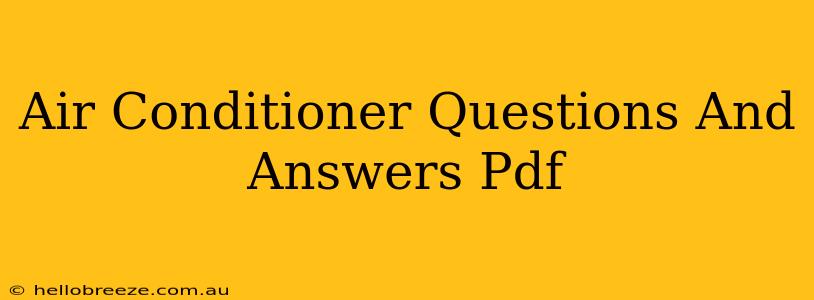Summer heat got you down? Understanding your air conditioner is key to staying cool and comfortable. This comprehensive guide answers frequently asked questions about air conditioners, helping you troubleshoot problems, optimize performance, and make informed decisions about your cooling system.
Common Air Conditioner Questions and Answers
This section addresses some of the most frequently asked questions about air conditioners, covering everything from installation to maintenance.
Installation & Setup:
- Q: How much does it cost to install an air conditioner?
A: The cost of air conditioner installation varies greatly depending on several factors: the type of AC unit (window, central, portable), the size of the unit required for your space, the complexity of the installation (e.g., existing ductwork, electrical requirements), and your geographical location. Expect a range from a few hundred dollars for a simple window unit installation to several thousand for a central air conditioning system. It's always best to get multiple quotes from reputable HVAC contractors.
- Q: What size air conditioner do I need?
A: Determining the right size air conditioner is crucial for optimal efficiency and cooling. Too small a unit will struggle to cool your space, while too large a unit will cycle on and off frequently, leading to higher energy bills and uneven cooling. Use a BTU (British Thermal Unit) calculator that considers factors like the square footage of your room, climate, insulation, and number of windows to accurately determine your needs.
- Q: Can I install an air conditioner myself?
A: While some smaller window units are relatively easy to install, larger units and central air systems require professional installation. Improper installation can void warranties, create safety hazards, and impact efficiency. It's always recommended to hire a licensed and experienced HVAC technician for professional installation.
Maintenance & Troubleshooting:
- Q: How often should I change my air conditioner filter?
A: Regular filter changes are essential for maintaining your air conditioner's efficiency and lifespan. A dirty filter restricts airflow, forcing the unit to work harder and potentially leading to breakdowns. Aim to replace your filter every 1-3 months, or more frequently if you have pets or allergies.
- Q: My air conditioner isn't cooling properly. What should I do?
A: There are several reasons why your air conditioner might not be cooling properly. First, check the filter. A clogged filter is a common culprit. Then, ensure the unit is properly powered and that the thermostat is set correctly. If the problem persists, it may indicate a more serious issue, such as refrigerant leaks, compressor problems, or electrical faults. Contact a qualified HVAC technician for diagnosis and repair.
- Q: What are the common signs of an air conditioner needing repair?
A: Pay attention to these warning signs: unusual noises (like banging, rattling, or squealing), weak airflow, unusual smells, higher than normal energy bills, fluctuating temperatures, or ice forming on the unit.
Energy Efficiency & Costs:
- Q: How can I save money on my air conditioning costs?
A: Several strategies can help lower your energy bills. Regular maintenance (including filter changes), proper insulation, sealing air leaks, using window coverings to block sunlight, setting your thermostat efficiently (consider programmable thermostats), and choosing an energy-efficient unit are all effective ways to save money.
- Q: What is SEER rating?
A: The Seasonal Energy Efficiency Ratio (SEER) rating measures the cooling output of an air conditioner relative to the energy it consumes. A higher SEER rating signifies greater energy efficiency.
Beyond the Basics: Advanced Air Conditioner Topics
This section delves into more specific questions about air conditioner types and technology.
Types of Air Conditioners:
- Window Air Conditioners: These are budget-friendly options suitable for single rooms.
- Portable Air Conditioners: These offer flexibility but may be less energy-efficient.
- Central Air Conditioners: These systems offer whole-home cooling but require professional installation.
- Ductless Mini-Splits: These systems are energy-efficient and ideal for zoning.
Advanced Technologies:
- Inverter Technology: Provides more precise temperature control and increased efficiency.
- Smart Thermostats: Offer remote control and learning capabilities for optimized energy use.
This FAQ guide provides a starting point for understanding your air conditioner. Remember, consulting a qualified HVAC professional is always recommended for significant repairs or complex issues. Staying informed about your cooling system ensures a comfortable and cost-effective summer.

